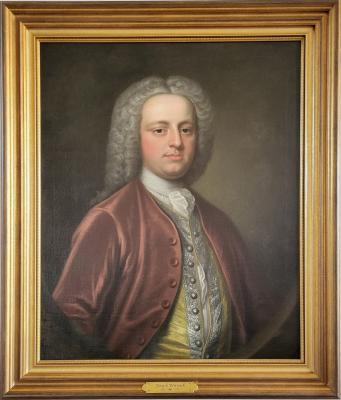
Joseph Pennock (1677–1771) was a colonial legislator, justice of the peace, and country farmer. In 1738, he built Primitive Hall in West Marlborough Township, Chester County, Pennsylvania.
Early Life and Family Background
Joseph's father, Christopher Pennock, was a Quaker shopkeeper from Cork, Ireland. He was imprisoned and fined for his religious beliefs. Joseph’s mother, Mary Collet Pennock, was the daughter of wealthy Quaker George Collet.
Christopher and Mary married in 1672 and moved to her father’s estate in Clonmel, Ireland, where Joseph was born on November 18, 1677.
In 1683, George Collet bought 5,000 acres in Pennsylvania. The next year, Christopher and Mary emigrated with their children—Nathaniel, Joseph, Elizabeth, and Ann—plus Christopher’s daughter Sarah (from his first marriage) and George Collet Jr.
They settled in Philadelphia, where Christopher was active in the Quaker community. He made a living by manufacturing tools for processing wool and linen and also owned a brewery in Maryland.
Family Separation and Return to Ireland
In 1686, Mary and three of her children, including Joseph, returned to Ireland. Christopher blamed Mary’s brothers for turning her against him:
“They did me the greatest wrong… They not only set her against me but branded me with drunkenness… and caused her to leave me when I was sick and in distress.”
Though Christopher and Mary exchanged letters over the years, they never reconciled. In 1700, Christopher formally cleared his name with the Philadelphia Quaker Meeting, which declared he had lived “a good life and conversation.”
Christopher died in 1701. Mary died in 1725.
Joseph Returns to Pennsylvania
Joseph grew up on his grandfather’s estate in Clonmel. After his grandfather died in 1698, Joseph inherited 3,000 acres in Philadelphia. When Christopher died in 1701, Joseph also inherited his property and decided to move to Pennsylvania.
On his voyage to America, Joseph was captured by privateers and imprisoned at Saint Malo, France for a year. After enduring harsh conditions, he finally made it to Philadelphia. With help from a family friend, he proved his identity and claimed his inheritance.
Marriage and Family Life
Joseph met Mary Levis, the daughter of immigrants from Leicestershire, England. She was wary of Joseph at first—he wore a wig, which Quakers frowned upon. As a test, Mary hid his wig one night. When Joseph appeared cheerful the next morning, wearing his natural hair, she was reassured.
They married in 1705 at Darby Friends Meeting and had 11 children. In 1710, they moved to a 1,250-acre property in Marlborough Township (now West Marlborough). Their first home at the Primitive Hall site was built near the road.
Public Service and Quaker Involvement
In 1716, Joseph was elected to represent Chester County in the Pennsylvania Assembly. He served until 1744.
In 1721, he formally returned to the Quaker faith, expressing regret for past behavior and a desire to rejoin the community. He became a trustee of the New Garden Friends Meeting and helped acquire land for the London Grove Meeting House, located near his property.
In 1729, Joseph was appointed Justice of the Peace for Chester County. One window in the Primitive Hall basement has bars, suggesting it may have held prisoners overnight.
A Colorful Character
Despite his position, Joseph was known to occasionally partake in celebrations. In 1732, he was reportedly “overtaken with strong drink” at the Darby Meetinghouse. He wrote a formal apology and promised to do better.
View Joseph Pennock's Confession Letter
Joseph was also known for his hospitality. According to local accounts:
“Friendly Native Americans made his house their occasional winter reprieve… Often when the family came down in the morning, they would find the kitchen floor covered with Indians sleeping around the fire.”
Later Years and Legacy
Joseph and Mary gave land to several of their children so they could build homes nearby. Mary passed away in 1748 at age 53. Although Joseph retired from politics, he continued to be involved in local affairs.
Two letters from 1764 survive:
- One from John Morton, a future signer of the Declaration of Independence, asking for Joseph’s political support.
- Another from Joseph’s cousin Stephen Collett in Ireland, asking for financial help. Joseph replied that the land Stephen referenced had been sold and that his claim had no basis.
Joseph died in 1771 at the age of 95.
His obituary in The Pennsylvania Gazette praised him:
“He served his country with ability and integrity. He had a natural politeness and sweetness of manners that irresistibly attracted respect and love from all.”